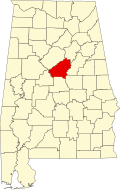Vandiver, Alabama | |
|---|---|
 Vandiver Post Office | |
 Location of Vandiver in Shelby County, Alabama. | |
| Coordinates: 33°29′08″N86°28′56″W / 33.48556°N 86.48222°W [1] | |
| Country | United States |
| State | Alabama |
| County | Shelby |
| Area | |
• Total | 20.85 sq mi (54.01 km2) |
| • Land | 20.31 sq mi (52.60 km2) |
| • Water | 0.54 sq mi (1.41 km2) |
| Elevation | 531 ft (162 m) |
| Population (2020) | |
• Total | 1,084 |
| • Density | 53.4/sq mi (20.61/km2) |
| Time zone | UTC-6 (Central (CST)) |
| • Summer (DST) | UTC-5 (CDT) |
| Area codes | 205, 659 |
| GNIS feature ID | 128408 [1] |
Vandiver is a census-designated place (CDP) and unincorporated community in Shelby County, Alabama, United States. Its population was 1,084 as of the 2020 census. One structure in Vandiver, the Falkner School, is listed on the Alabama Register of Landmarks and Heritage. [3]
